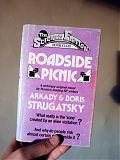
Arkady & Boris Strugatsky
Roadside Picnic
The premise of Roadside Picnic is this: at six spots around the globe, extraterrestrials landed then left. The Zones where they touched down are strange and mysterious places, full of forces unknown to our earthly own. The Visitors left rubbish and the rubbish is worth money. Stalkers go in to collect and take the valuables out.
Stalking is a dangerous occupation, if it is an occupation at all. The Zone is a no-man’s-land of hazards, a wasteland of intermittent deathly slime and fatal cobwebs and gravioconcentrates and other unwelcoming curiosities. The Zone is protected by gun toting soldiers who fear it.
Goddamn that Zone. You can’t get away from it. Wherever you go, whoever you talk to, it’s always the Zone, the Zone, the Zone.
The children of stalkers are mutated; the stalkers are themselves effected. The humdrum town of Harmont, Canada was plagued then became ghost town to boom town full of waywards and those drawn to the prospect of “easy” money. Despite all the technological benefits coming out of the Zone—into the right hands or the wrong hands—the Zone is not a good place nor a good place to go to. When Professor Pilman is asked about the most important discovery of the Visitation’s aftermath, he replies that the Visitation happened: humans are not alone in the universe. When he’s asked, “What makes men great?” He replies:
That, despite all this, he has survived and intends to survive in the future.
Redrick is a child of the Zone. A young man of Harmont when the Visitation occurred, he heard his calling, became a stalker. Red goes into the Zone for money; he doesn’t like “penny pinching,” fair enough and for the willing, the Zone pays plenty. But there is some thin line the stalkers walk which separates their entrance into the Zone from the Zone’s entrance into them.
Red, at the beginning of Roadside Picnic, was a young man with prospects. In the Zone he is consciously aware of the nuances and the dangers, the changes and the oddities of the forlorn place, with the signature contempt of one who loves what he hates. He makes an unfortunate mistake and his friend dies, but that’s the Zone. For years Red is “lucky.” He survives. He is no longer a conscious being navigating through spaces, now Red sees, registers and interprets the alien environment without knowing. Surviving the Zone is a skill, an artform, which Red excels at, which he has internalized to the point of well-greased machinery.
When Red comes out of the Zone he must adjust to the joy of living. His panacea is drink. Red’s wife Guta, is strangely complacent—she chooses to have their baby though she knows it’s going to be a freak. She is “strong” and never complains. She serves bloody marys and coffee to Red, his cronies and the occasional zombie. Between the couple there is the lack of emotion or emotion repressed, almost predictable for these unprectabilities. It seems they can only share the sentiment: I’ve made it, he’s alive, I’m alive, like quiet ripples of relief.
Roadside Picnic resounds with an emptiness, a barrenness which feels like war times. It is a strongly Russian book. Something about the ability to retain our humanity amidst a great spiral of events, beyond the Earth or with it. Something about why we insist in our survival despite the horrors, when every good has been extinguished from our memories so it appears as if there had never been anything good at all.
A strange and very new feeling overwhelmed him. He was aware that the feeling was really not new at all, that it had been hidden in him for a long time, but that he was acknowledging it only now […]. And everything that had seemed like nonsense […] turned out to be his only hope, the only meaning of his life. Because he finally understood: the only thing he had left in the world […] was the hope of a miracle.
Putting down Roadside Picnic I see little difference between science fiction and traditional literature when the book is well written. Science fiction is another packaging for stories we’ve been telling all along. Yet, sci-fi is a refreshing break and good for the imagination.
· · · · · · · · · · · · · · · · · · · ·